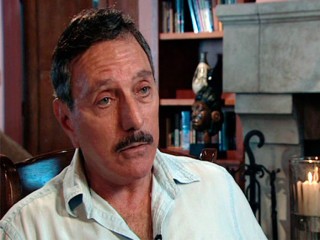
William Peter Blatty biography
Date of birth : 1928-01-07
Date of death : -
Birthplace : New York City, New York, US
Nationality : American
Category : Arts and Entertainment
Last modified : 2011-06-06
Credited as : Author, The Exorcist, Twinkle, Twinkle, Killer Kane!
0 votes so far
His most recent works include the novels Elsewhere (2009), Dimiter (2010) and Crazy (2010). He is also featured in the 2010 Smoke And Mirrors anthology, featuring the teleplay "Hell Hospital" and the treatment "Faith" .
Career:
In the 1950s, Blatty worked as the public relations director at Loyola University of Los Angeles and as the Director of Publicity at the University of Southern California. Blatty later wrote an article published in the Saturday Evening Post about meeting movie stars in Hollywood while posing as "Prince Xeer," a fictitious blacksheep son of King Saud of Saudi Arabia. To promote his first book, Which Way to Mecca, Jack?, Blatty was a contestant on the Groucho Marx quiz show You Bet Your Life, winning $10,000: enough money to enable him to quit his job and write full-time.
In 1960 Blatty published Which Way to Mecca, Jack?, which dealt humorously with both early life and his work at the United States Information Agency in Lebanon. He then published the comic novels John Goldfarb, Please Come Home (1963), I, Billy Shakespeare (1965) and Twinkle, Twinkle, "Killer" Kane (1966). Though he achieved great critical success with these books — Marvin Levin in the New York Times, for example, led off a review with "Nobody can write funnier lines than William Peter Blatty, a gifted virtuoso who writes like (S.J.) Perelman," sales and commercial acceptance was lacking.
It was at this point that Blatty began a fruitful collaboration with director Blake Edwards, writing scripts for comedy films such as A Shot in the Dark (1964), What Did You Do in the War, Daddy? (1966), Gunn (1967), and Darling Lili a musical starring Julie Andrews and Rock Hudson. (1970). Without Edwards, Blatty also worked on comedy screenplays as "Bill Blatty", two such credits being the Danny Kaye film The Man from the Diner's Club and the Warren Beatty-Leslie Caron film "Promise Her Anything." Others were "John Goldfarb, Please Come Home!", and "The Great Bank Robbery."
Later Blatty resumed novel writing. Allegedly retiring to a remote and rented chalet in woodland off Lake Tahoe, Blatty wrote The Exorcist, a story about a twelve-year-old girl being possessed by a powerful demon that remained on the New York Times bestseller list for 57 straight weeks and at the Number One spot for 17 of them. It would eventually be translated by himself and director William Friedkin into one of the most famous and controversial mainstream horror movies of all time. According to Blatty, Friedkin edited the film in a New York Fifth Avenue office building with the number 666, and Blatty would go on to win an Academy Award for his "Exorcist" screenplay, as well as Golden Globes for Best Picture (he produced the film) and Best Writing. He has made the claim that in its first weeks of publication, "The Exorcist" novel, despite excellent reviews and much advertising by the publisher, Harper and Row, was deemed a failure and was being returned by bookstores by "the carload" until what he calls "an exraordinary intervention by Fate" which he refuses to describe.
In 1978, Blatty re-hashed his novel Twinkle, Twinkle, "Killer" Kane! into the retitled The Ninth Configuration; and in 1980 he wrote, directed, and produced a film version. A meditation on God's existence described by one critic as "The Marx Brothers Meets Spellbound" and greeted as a "masterpiece" by The Cincinnati Post and "the finest large-scale American surrealist film ever made" by Peter Travers in People Magazine, the film, nevertheless, was a commercial flop. It has since acquired a rather sizable cult following. In 1981 it was nominated for three Golden Globes, among them Best Picture, and won the Best Writing Award against competition that included "The Elephant Man," "Ordinary People," and "Raging Bull."
In 1983, he wrote a novel called Legion, a sequel to The Exorcist which later became the basis of the film The Exorcist III. Blatty originally wanted the movie version to be titled Legion but the film producers wanted it to be more closely linked to the original. The first sequel, Exorcist II: The Heretic (1977) was disappointing both critically and commercially. Blatty had no involvement in this first sequel and his own follow-up ignored it entirely.
Blatty's autobiography is titled I'll Tell Them I Remember You. A short critical essay on Blatty's work can be found in S. T. Joshi's book The Modern Weird Tale (2001). Essays studying all Blatty's novels can be found in Benjamin Szumskyj's American Exorcist: Critical Essays on William Peter Blatty (McFarland, 2008).
Blatty's latest works are the novels Elsewhere (2009), Dimiter (2010) and Crazy (2010). He is also featured in the 2010 Smoke And Mirrors anthology, featuring the teleplay "Hell Hospital" and the treatment "Faith". According to Blatty, in his June 30 interview with "Authors on Tour," director William Friedkin has also set out to make Dimiter a feature film, marking their first collaboration in almost 40 years.
















